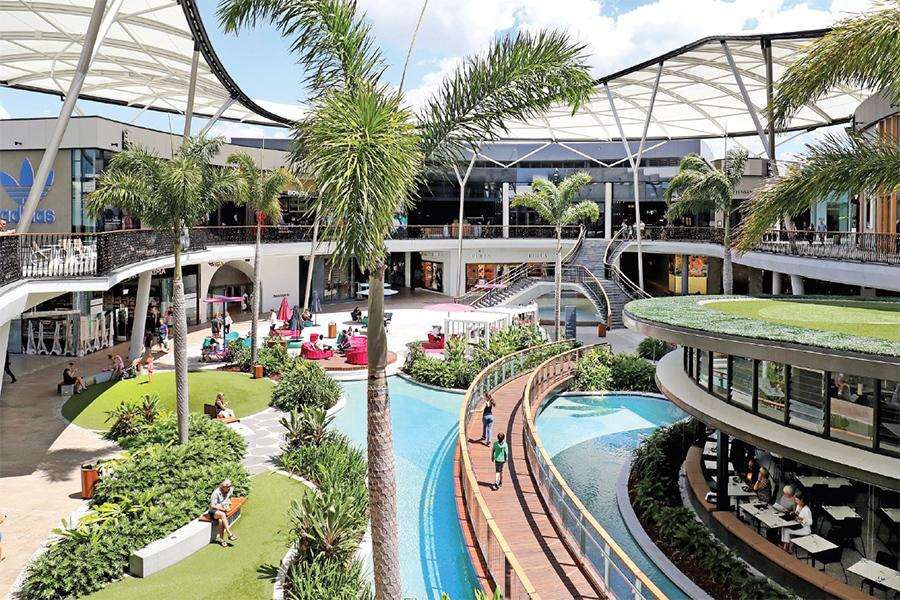Copious amounts of editorial we receive are written about the internet, e-commerce, Amazon, bricks-and-mortar versus online shopping et al! And we’re not the only ones. National papers are full of it; all great stuff for the analysts and the doomsayers. It reached a peak some days back when Alan Kohler, ABC financial analyst commented that “shopping centre companies had been sold down – must be the threat of internet shopping.” I wonder where they get this stuff?
I really can’t see what all the fuss is about. Of course, our industry is facing challenges right now; when didn’t it?
Yes, quite a few retailers have failed recently, but nowhere near as many as those who’ve come to our shores and opened up new ventures. Opinion is that about another 40-odd retailers, mostly European and American, are serious about moving here and soon they’ll all be looking for space. Where? In our centres, naturally.
So is everything fine and dandy? Do we have anything to fear or is it just a lot of uninformed froth and bubble?
The short answer to that is ‘no’. We’ve got some serious challenges. But in order to address them, we need to be clinically diagnostic in defining them. ‘E-commerce’ is not our problem; it’s a ‘retail’ problem. We are not retailers, we are ‘property’ people – and property doesn’t compete with e-commerce. The fact that our property is full of shops and that those shops are facing challenges is a somewhat spurious reasoning in the case against the continuing relevance of shopping centres.
The concept of e-commerce diminishing retail is quite ludicrous. Jingdong, the second largest e-commerce company in the world (behind only Alibaba) recently announced that, over the next five years, it will open one million convenience stores in China. That to me seems like an expansion of retail! That they are opening a million stores may well be all about distribution – in South Korea, Japan and Taiwan and other parts of South East Asia, convenience stores like 7-Eleven are pick-up points for ‘online’ purchases. So here we have an online business, the second-largest in the world, with a plan to open a million shops!
We are in the business of satisfying public demand for retail property but in our business, the term ‘retail’ is so wide, so all-encompassing that it almost defies definition. Is a cafe or a restaurant retail? What about a massage shop, a building society or a TAB? But then do we really have to know? If the public wants cafes and restaurants, TAB outlets and massage spas then let’s provide them. Are we facing challenges because we’ve been concentrating too much on ‘traditional’ retail to fill our spaces, rather than finding out what the general public like to do together in order to socially interact (or to get social interaction as a by-product)?
The greatest challenges for e-commerce companies involve logistics, delivery, storage, packaging, display and the absence of touch, feel, reality and experience. Retailers face other challenges in their quest to improve sales against the competition from e-commerce.
The solution and the future is obvious; what will happen is that instead of competing, they will come together and join forces.
The way retail operates will change; the way e-commerce operates will change. Already in China, many retail sales assistants in real bricks-and-mortar shops in shopping centres are receiving sales commissions for ‘online’ sales. When people visit shops, try on, touch, feel and smell products and then purchase them online, the mechanism for the salesperson or the retail employee to be rewarded for service has already been established.
The retail and e-commerce businesses will work it out, but in the process, the opportunities for the shopping centre management industry to play a part will increase. What will never happen is that social interaction through the buying and selling of consumer goods and services will disappear. In fact, it is likely that it will increase. In a world in which the internet and computers have recently contributed to a degree of social isolation, the human need for interaction will see shopping centres take an ever-increasing role.
Those who don’t understand this, those who naively see just a simple battle between bricks-and-mortar retail versus e-commerce, might see e-commerce as a victor. If some of those people are analysts who have a voice, they might cause a flight from shopping centre portfolios. Should that happen, there might well be bargains around. I’ll be buying!





















sebskiff
20-09-2017
Thanks for this. Glad to see that common sense still has a role to play, now and in the future. It may not sell as well as fear but good to know there are some sensible people in our business.